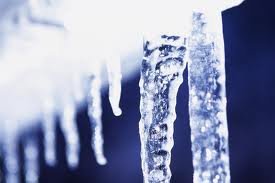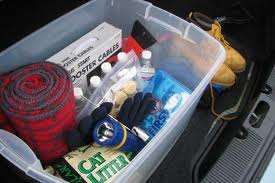Winter Weather Survival Kits for Home and Car
Posted in Miscellaneous on 02/01/2011 10:35 pm by CC
 As a winter storm of epic proportions blankets much of the nation in snow and ice this week, I wondered if I was ready for an extended power outage. Perhaps because the power flickered a few hours ago – giving me a scare and glimpse of what life would be like without electricity in the dead of winter.
As a winter storm of epic proportions blankets much of the nation in snow and ice this week, I wondered if I was ready for an extended power outage. Perhaps because the power flickered a few hours ago – giving me a scare and glimpse of what life would be like without electricity in the dead of winter.
“Where are the flashlights?”, ” How will we cook if the electricity goes out?” (Wish we had a gas stove.) ” Will we be able to stay warm, or will we need to flee to the nearest warm hotel?” These are all questions that I pondered during a very brief powerless (no pun intended) life tonight.
Before panic sets in within your house, there are many things you can do to stay safe and warm. North Carolina’s Electric Cooperatives suggests having the following items on-hand in case of a winter weather emergency:
The Essentials
- Food: Food that requires no cooking or refrigeration such as bread, crackers, cereal, canned foods, and dried fruits. Remember baby food and formula if you have young children.
- Water: In case water pipes freeze or rupture, keep a supply of tap water or purchase bottled water. The recommended amount of water to keep is 5 gallons per person.
- Medicines: Roads may be inaccessible for several days due to the storm. Make sure to order or refill any prescriptions that family members may need.
- Identification: Make sure to keep forms of identification with you such as social security card, passport, photo ID, and driver’s license. In addition, make sure to have bank account information, and insurance policies.
Emergency Materials
- Alternate methods to heat your home:
Dry firewood for a fireplace or wood stove
Kerosene for a kerosene heater
Furnace fuel (coal, propane, or oil)
Electric space heater with automatic shut-off switch and non-glowing elements - Blankets
- Matches
- First Aid kit and instruction manual
- Multipurpose, dry-chemical fire extinguisher
- Flashlight
- Battery-powered radio, clock/watch
- Extra batteries
- Shovel
- Rock salt
- Non-electric can opener
What if you’ll be driving in the midst of a severe winter storm? The National Oceanic and Atmospheric Administration (NOAA) recommends planning your travel and checking the latest weather reports along your route. They also offer the following tips to keep you prepared in the event extreme winter weather:
- Carry a WINTER STORM SURVIVAL KIT:
- blankets/sleeping bags;
- flashlight with extra batteries;
- first-aid kit;
- knife;
- high-calorie, non-perishable food;
- extra clothing to keep dry;
- a large empty can and plastic cover with tissues and paper towels for sanitary purposes;
- a smaller can and water-proof matches to melt snow for drinking water;
- sack of sand (or cat litter);
- shovel;
- windshield scraper and brush;
- tool kit;
- tow rope;
- booster cables;
- water container;
- compass and road maps.
- Keep your gas tank near full to avoid ice in the tank and fuel lines.
- Try not to travel alone.
- Let someone know your timetable and primary and alternate routes.
My home-preparedness kit is excellent, but I’d be in big trouble if I were stuck in my vehicle this winter. How do your home and vehicle survival kits fare? “Bring it on!” or “Yikes, I need help!”?
Let’s chat!
Love to all!
CC



